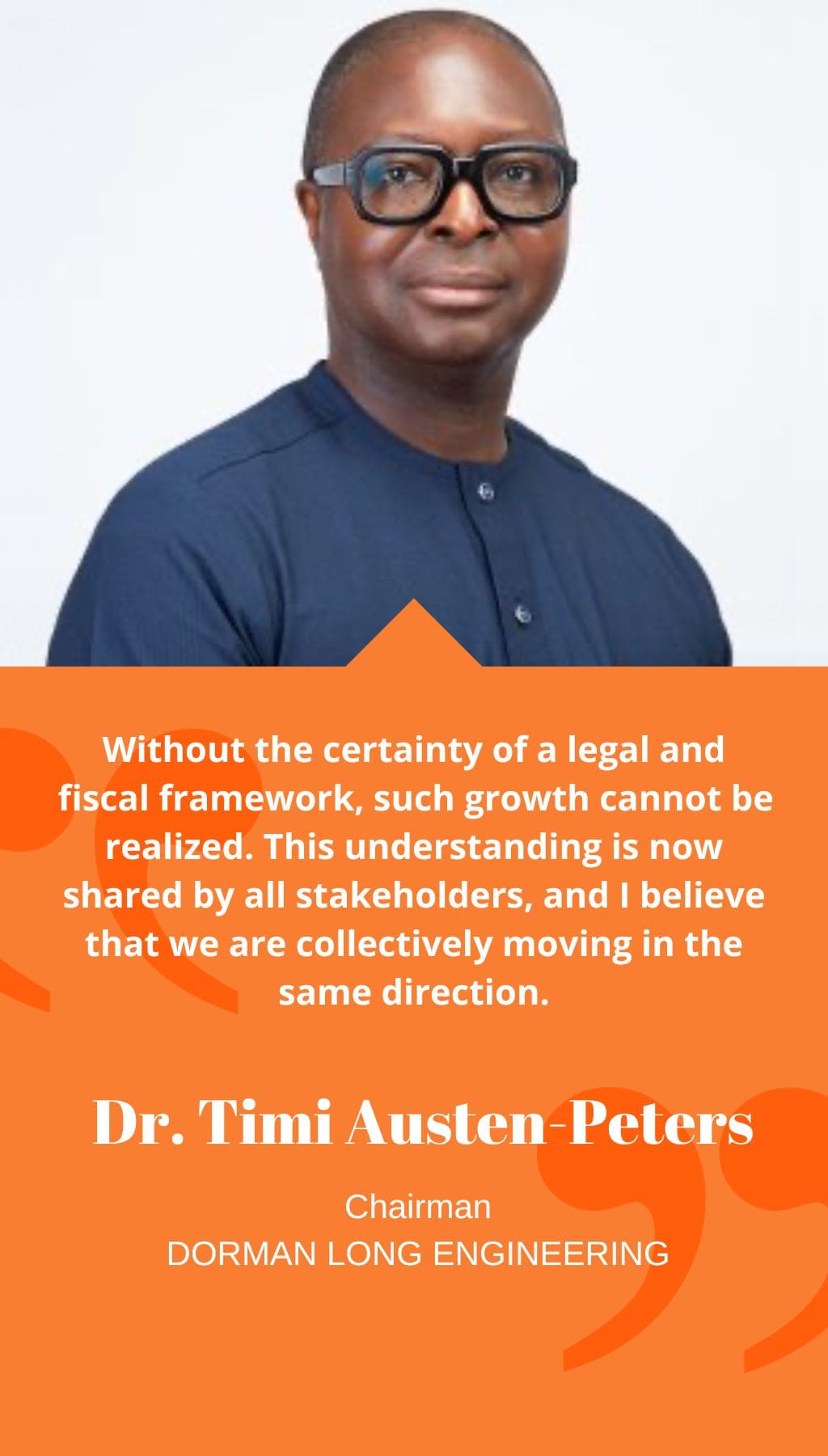
- Nigeria | 30 June 2020

Could you provide a comprehensive overview of Dorman Long and its role within the oil and gas industry?
Certainly. Dorman Long is a well-established steel engineering company that has been operating for 70 years. Initially focused on structural steel, we expanded our operations into the oil and gas sector in the 1970s. Today, we have positioned ourselves as a preferred provider of various products such as pressure vessels, splitters, heat exchangers, platforms, jackets, and small EPC steel works. Our capabilities extend to fabrication, and we proudly possess the largest galvanizing plant in West Africa. Additionally, we engage in procurement and maintenance services for large oil and gas facilities, including FPSOs (Floating Production Storage and Offloading vessels). The presence of our galvanizing plant sets us apart in the market. We hold certifications from America, Europe, and Nigeria, enabling us to build and repair pressure vessels. With the ability to roll up to steel plates of up to 120mm thickness, we possess a unique capacity within Nigeria.
At present, Dorman Long operates solely in Nigeria. However, we have established a subsidiary in Ghana, which is yet to become operational. Furthermore, we are in the process of establishing a subsidiary in Mozambique. In the past, we undertook significant work for Shell in Gabon, and we have had operations in Benin and Cameroon.
Could you highlight some of the ongoing projects that Dorman Long is currently involved in?
Currently, Dorman Long is engaged in the Assa North gas project, which stands as the largest gas-to-power project in Nigeria. It represents the first of seven critical gas projects in the country. Our role in this project involves fabrication. Additionally, we have been responsible for maintaining the Bonga FPSO for approximately nine years. We undertake extensive work for FPSOs and provide fabrication services for various international oil companies (IOCs). We are also in line to secure significant work for Train 7, another major project in the sector.
How confident are you in the passing of the Petroleum Industry Bill (PIB) this year?
I am hopeful that this year will witness the passing of the PIB. The urgency for exploration and production to increase in numbers is becoming increasingly evident. Without the certainty of a legal and fiscal framework, such growth cannot be realized. This understanding is now shared by all stakeholders, and I believe that we are collectively moving in the same direction.
It’s important to acknowledge that the legal framework is never perfect. Nevertheless, as gas projects like Assa North and Train 7 demonstrate, the significance of gas is on the rise in Nigeria. Given Nigeria’s status as a gas-rich country, the importance of this resource is expected to continue growing in the future.
How has local content policy facilitated the rise of Dorman Long?
Local content policy has been integral to our growth and success. Without it, Dorman Long would not have had the opportunity to engage in critical areas such as pressure vessels, large-scale maintenance, and participation in projects like Train 7. Local content policies have opened doors for us to harness opportunities within the country. However, it’s essential to emphasize that the effectiveness lies not solely in legislation, but in its implementation and execution. If the existing legislation is vigorously enforced, there may not be a need for significant changes or amendments.
How do you anticipate the current pandemic impacting the Nigerian economy and the oil and gas sector? How has Dorman Long navigated through this challenging period?
The combined impact of the COVID-19 pandemic and depressed oil prices has had a profound effect on Dorman Long, particularly regarding staff welfare and business continuity. The restrictions on local and international movement have necessitated a change in our working methods. The uncertainty surrounding the duration of the pandemic and the recovery of oil prices has further compounded an already challenging situation.
To address these challenges, we have implemented several measures. Ensuring the safety and well-being of our staff is our top priority, and we have issued directives to ensure compliance with health risks and government regulations. We have encouraged those who can work remotely to do so, provided their work nature and personal circumstances allow for it. In compliance with federal and state regulations, our fabrication and galvanizing workshops have been temporarily shut down. However, we have maintained core crews for oil and gas infrastructure, especially offshore, and have arranged for limited rotations to ensure the continuous operation of essential infrastructure while safeguarding the well-being of our employees. Additionally, we have implemented cash preservation strategies, given the uncertainty surrounding the duration of these challenging times.
Fortunately, Dorman Long operates in a diversified business landscape. While our fabrication and galvanizing businesses have experienced significant disruptions, our maintenance business has remained resilient, providing ongoing work opportunities for a significant portion of our staff. This continuing economic activity is expected to generate revenue, either in the immediate or near future.
The current situation has reinforced the importance of local content. It has enabled business continuity, which would have been impossible if we heavily relied on expatriate workers. This continuity not only helps sustain employment but also ensures a revenue stream. Furthermore, local content plays a critical role in maintaining essential oil and gas infrastructure, enabling the pumping of oil, gas production, and ensuring the energy security of Nigeria.














